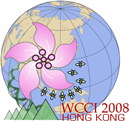
Ensemble Methods and Applications (EMA)
World Congress on Computational Intelligence (
WCCI 2008 . )
June 1-6, 2008, Hong Kong
(Poster)
Note: The submission Deadline for accepted papers is March 15 2008.
Organisers:
Chair: Dr. Wenjia Wang
School of Computing Sciences
University of East Anglia,
Norwich, UK
Important dates
Submission:
December 15, 2007
Notification:
Februray
1, 2008
Camera-Ready:
March 15, 2008
Conference:
June 1-6, 2008
Contact Information
Dr. Wenjia Wang
School of Computing Sciences, UEA, Norwich, NR4 7TJ, UK.
Email: wjw@cmp.uea.ac.uk
Tel: +44 (0)1603 592577
Fax: +44 (0)1603 593345
Scope
Ensemble as a powerful computational paradigm, which constructively combines multiple algorithms and models, has been increasingly applied for dealing with complex real-world problems in various fields for classification, prediction, regression, clustering, or feature selection. Hundreds and thousands of papers have been published reporting the research on this topic and applications. However, it appeared in most cases the accuracy of the ensembles built is not or only marginally better than that of individual models. This indicates that there are still some fundamental issues that are not well understood and certainly worth of further investigations. For example, what factors and in what extent they affect the performance of an ensemble? What methodology and procedure should be used or developed for constructing more effective ensembles in user-friendly environments. It is generally perceived that to make an ensemble more effective, apart from having relatively high accuracy, the individual models must be diverse from each other. Nevertheless, diversity does not come naturally, and measuring diversity and producing a high level of diversity are challenging tasks. The research on this topic seemed produced little or no real progress in last few years. So, it is vital to bring researchers together to dig-deep to find out the progress bottle necks of the ensemble methodology. Following a very successful special session on a similar topic in the last World Congress in 2006, it is necessary to have a follow-up special session but with a slightly widened theme aiming to bring in more researchers into the field to critically review the progress made in last two years on ensemble theories, diversity measures, construction strategies and their applications in various fields, and to identify the challenging research topics which can make the ensemble approach truly effective.
Topics
The major topics of interest for this special session include,
but are not limited to:
Ensemble methodology, strategies and techniques
Homogeneous and heterogeneous ensembles
Methods for buidling ensembles,
e.g. Boosting, Random Forest, etc.
Ensemble for classification, prediction,
clustering, feature selection
Diversity definition and measurement
Strategies and techniques for generating diverse models
Relationships between diversity and ensemble's accuracy
Decision fusion strategies
Evaluation of ensemble performance and comparisons with other approaches
Ensemble software development
Applications.
Special session papers are treated the same as regular conference papers, and will
be included in the conference proceedings.
Technical Committee
Chair: Wenjia Wang ( University of East Anglia, UK)
Derek Partridge (University of Exeter, UK), Philip Yu (IBM, USA), Ning Zhong (Maebashi Institute of Technology, Japan), Yinhui Jun (University of Manchester, UK), Daniel C. Neagu (University of Bradford, UK), Tony Bagnall, George Smith, Gavin Cawley, Bea de la Iglesia (UEA, UK)